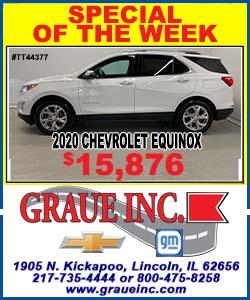McDonald's says focus on value is bringing back customers
[February 12, 2026] By
DEE-ANN DURBIN
McDonald’s focus on value is paying off.
The fast food giant said Wednesday that its global same-store sales — or
sales at locations open at least a year — jumped 5.7% in the
October-December period. That's better than the 3.9% Wall Street was
expecting, according to analysts polled by FactSet.
Chicago-based McDonald's fourth quarter revenue and earnings also beat
analysts' expectations.
McDonald’s cut prices on some U.S. combo meals in September. Those Extra
Value Meal promotions came on top of discounts that began earlier in
2025, like the McValue menu. McDonald's popular Snack Wraps, which
returned to menus in July for $2.99, also helped improve value
perceptions.
McDonald’s CEO Chris Kempczinski said those changes helped McDonald's
gain share among consumers with household incomes of $45,000 or less, a
segment that has been drifting away from the brand.
“McDonald’s is not going to get beat on value and affordability,"
Kempczinski said during a conference call with investors.
The company also boosted U.S. traffic in the fourth quarter with
marketing schemes, including the return of its Monopoly game in October
and a Grinch-themed meal in December. Kempczinski said McDonald's sold
50 million pairs of Grinch socks with those meals in the first few days
of the promotion, briefly making the company the largest seller of socks
in the world.
McDonald's said its same-store sales rose 6.8% in the U.S. in the
October-December period. Ian Borden, McDonald's chief financial officer,
said that pace will likely slow in the January-March period, partly
because severe winter weather has hurt traffic or forced some
restaurants to close or limit their hours.

[to top of second column] |

A sign for a McDonald's restaurant in Philadelphia, on Friday, June
6, 2025. (AP Photo/Matt Rourke, File)
 McDonald's focus on value and
marketing has been similar in international markets. In Germany, for
example, lower-priced McSmart snacks have boosted store traffic.
Same-store sales in McDonald's company-operated international
markets rose 5.2% in the fourth quarter; Borden also expects that
pace to slow in the first quarter due to weather impacts.
“We’re really confident about what’s within our control, really
confident about the underlying momentum of the business,” Borden
said.
The company said it's working on new menu items for this year,
including beverages inspired by its short-lived CosMc's restaurant
format. McDonald's said it plans to start selling energy drinks,
iced coffees and fruity refreshers under its McCafe brand sometime
later this year.
McDonald's revenue rose 10% to $7.01 billion in the fourth quarter.
That beat Wall Street's forecast of $6.84 billion.
Net income rose 7% to $2.16 billion. Adjusted for one-time items,
including restructuring charges, McDonald's earned $3.12 per share.
That also beat analysts' forecast of a $3.05 per share profit.
McDonald's shares were flat in after-hours trading.
Other chains have also been focused on their value message over the
last year. Taco Bell, which expanded its value menu in January 2025,
said last week that its same-store sales jumped 7% in the
October-December period.
All contents © copyright 2026 Associated Press. All rights reserved |